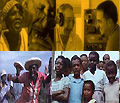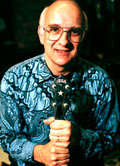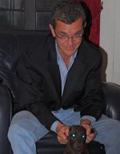HOME | SYNOPSIS | TREATMENT | IMAGES + CLIPS | PEOPLE
PeopleCopyright in the Digital Age


|
JAMES CARTER
In 1959, while on a work gang at Mississippi State Penitentiary in Lambert, James Carter sang the song "Po Lazarus" for Alan Lomax, who recorded for Folkways Records as part of his broader efforts to preserve American folk music. Forty-three years later, Carter, 76, flew to Los Angeles for the Grammy Awards to be celebrated for that recording. "Po Lazarus" had been included in the soundtrack of the film "O Brother, Where Art Thou?" which had won album of the year honors. Carter, son of a Mississippi sharecropper, had never heard of the album or the film. But, as it climbed the charts and sold millions of copies, its producers were looking for him to acknowledge his contribution and pay him thousands of dollars in royalties. In 2002, Lomax's daughter, Anna Lomax Chairetakis, presented Carter a platinum album of the soundtrack and his first royalty check for $20,000. Carter will earn royalties as the lead performer on the recording and will also earn songwriter royalties because "Po Lazarus" is in the public domain. Interviews: Anna Lomax Chairetakis and Tony Seeger |
 |
LEDOH
Ledoh is Artistic Director of Salt Farm Butoh Dance Company, a group of San Francisco Bay Area performers who explore their diverse cultural roots via the art of Butoh, a contemporary form of Japanese dance. Ledoh was born into the Ka-Ren hilltribe of Burma, a heritage which instilled a sense of all culture, including modern technological society, as something organic. Salt Farm dissolves the boundary between life and dance, engaging local community and often sharing performances beyond the confines of traditional theater spaces. As an artist working to keep his Ka-Ren culture alive, Ledoh preserves traditional social knowledge while simultaneously inventing innovative new ways to deploy that knowledge, and perform that culture in a locally meaningful way. |
| MARJORIE INGALL A freelance writer formerly adored as "Margie," Marjorie used to be the Senior Writer at Sassy magazine. She's written for Ms., Mademoiselle, Wired, Food & Wine, New York, Blender (as a sex columnist), ST!M, The San Francisco Examiner, and a whole bunch of other places. She was a columnist for The Web magazine until its recent demise; and also did a humor column for CuisineNet called "You Gonna Eat That?" Marjorie wrote a humor book called The Field Guide to North American Males; co-wrote a safer-sex guide called Smart Sex in 1998. |
|

|
ROB MALDA & JEFF BATES
In 1997, Rob and Jeff co-founded Slashdot, a web site that became a civic center for the open source movement. Suddenly, these guys in their early twenties, working out of Holland, a small town in Michigan, became two of the most important voices in Linux. Today Slashdot serves millions of pages to hundreds of thousands of readers. Journalists and computer executives now hit the site to get a snapshot of the community's take on issues of the day. Though Slashdot has been enormously successful, it still retains a strong sense of Rob's and Jeff's character. Where else can you find news on scientists breaking the speed of light, an analysis of a new open source license and an in-depth exposé on Lego all in the same place? |
 |
ANTHONY SEEGER
Curator of the Folkways Collection and Director of Smithsonian Folkways Recordings at the Smithsonian Institute from 1988 to 2000, Anthony is now a professor of ethnomusicology at UCLA. His writings have focussed on the Suya Indians of Brazil, issues of land and human rights for Brazilian Indians, and issues of archiving and intellectual property. He is currently working on the book, Who Owns Music, about the intellectual property rights of folk artists in the global economy. |
 |
JOHN BRANCATO
Since 1985, John has written or re-written more than forty feature-length screenplays, including "The Game" with Michael Douglas, "The Net" with Sandra Bullock, and the upcoming "Terminator 3." Born and raised in the New York City area, John majored in philosophy at Harvard College, where he was editor and vice-president of the Harvard Lampoon. He worked as an editor, writer or cartoonist for newspapers and magazines before happening upon screen writing in 1985. |
- Chuck D
- Mikey Hart
- George Clinton
- Janis Ian
- Pete Seeger
- Tony Seeger
- Larry Lessig (Already Shot)
- Anna Lomax Chairetakis
- Richard Stallman (Already Shot)
- Eric Raymond (Already Shot)
- Brian Behlendorf (Already Shot)
- Tim O'Reilly
- Miguel de Icaza (Already Shot)
- Bruce Perens (Already Shot)
- Ralph Nadar at The Bazaar, Dec, 1999 (Already Shot)
- Douglas Adams at ApacheCon Europe 2000 (Already Shot)
- Howard Rheingold
- Justin Hall
HOME | SYNOPSIS | TREATMENT | IMAGES + CLIPS | PEOPLE